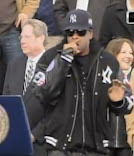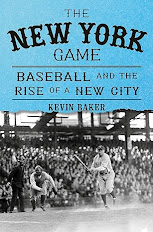I was copied on this missive from an angry IT IS HIGH reader - (note: All IT IS HIGH readers are angry IT IS HIGH readers) - to MLB. It's printed here, with the name withheld.
I go back and forth on letter-writing campaigns. Most involve templates - easy to send, easy to dismiss. Hashtags put out the word and make us feel empowered, but do they last? Dunno.
At the end of the day, I want to believe that an honest, heartfelt letter to the monolith might just get passed up the chain and be read. Maybe it even changes somebody. Yeah, that's naive - but I prefer to think it.
Here is just such a letter, sent over the weekend... Dear
PR Dept.
I
suppose you are keeping track of fan opinions about the lockout.
Accordingly, please count me among the fans who lay blame for the lockout
entirely on the MLB ownership.
It
is clear that the 30 ownership groups have mapped out a strategy that is
designed to squeeze if not break the MLBPA. A delay to the start of the
season until May was always a goal since April games are not profitable to
owners and they know that ditching April baseball will hurt the players
(through loss of salary) much more than it will hurt their own bottom lines.
As a
result of my disgust with the owner-imposed lockout and their subsequent
disingenuous negotiations, I pledge (along with many other fans I know on
social media) to hurt your own bottom line. You are killing the golden
goose when you anger the fans whose pocketbooks you ultimately rely upon.
We pledge to
- stop attending games in person;
- stop watching games on tv whether they are televised
nationally or via the local cable carriers;
- drop our subscriptions to mlbtv;
- stop betting through Draft Kings et al.;
- stop going to the MLB website.
In
short, I pledge to stop caring about baseball since it is clear that ownership
cares much more about their profit margins than the game itself, and most
certainly not about the fans who are your customers. You should recognize
that times have changed. There is a lot of competition nowadays for the
time, attention and money of baseball fans that you used to rely upon. It
is easy to find alternatives and indeed throughout this lockout I have diverted
my time, attention and money to other sources. I care less about baseball
than before. Even writing this email is an exercise in futility that I
delayed doing for many weeks because I just don’t care about baseball as much
as I used to. Also, we have social media now and that allows us to organize
and protest much more effectively and loudly than ever before.
It’s
a shame you are killing the golden goose. I hope that your next tv
contracts are much less lucrative as a result of so many fans no longer
watching like we used to. You only have yourselves and your own greed to
blame.
Farewell,
MLB. It was nice knowing you, but now it is time for this fan to move on.
(Name withheld on this blog)
P.S.
I fully expect that once you end this lockout that you will mount an
impressive PR campaign aimed at reclaiming fans’ loyalty, time and money.
You will tell us how important we fans are to you and how much you
miss us and how you are sorry for what happened because of course you have no
culpability for it. That campaign will be galling and insulting to us.
We will know it is all lies. Don’t waste your money mounting it.
Keep the money and pad your margins while you can because you are killing
the sport and the interest of the fans who once loyally supported it.
In a second note to IT IS HIGH, the writer adds: If the Ukrainians can fight the mighty Russian army with admirable bravery, surely we can mount this slight form of resistance.
I'm in. Want to join the resistance? Send them your personal letters - publicrelations@mlb.com - and copy me at hseely@twcny.rr.com. Recruit others to do the same. I'll print them.










































11 comments:
BRAVO BRAVA!!!!!!
All of these I have done, and will continue to do going forward,,,,
stop attending games in person;
stop watching games on tv whether they are televised nationally or via the local cable carriers;
drop our subscriptions to mlbtv;
stop betting through Draft Kings et al.;
stop going to the MLB website.
Amen.
There is another potential way to look at this mess: the owners are using the lockout and suspension of games not only to drive a hard CBA bargain, but I am inclined to think they want to shorten the season, thereby reducing salaries across the board and in the end adding games to a "post-season." I can almost guarantee that the advert dollars in the "post-season" will more than replace April game revenue.
Here's the other problem: the average NFL "game" lasts about 15 minutes, tops. Add another 30 minutes or so of pundits explaining and commenting. That leaves 2 hours and 15 minutes for advertising. If you watch two games on Sunday that means you're sitting in front of nearly FIVE HOURS OF ADVERTISING, and that doesn't take into account the pregame and half-time shows.
An MLB game without all the noise and hoopla, will take around 2hrs and 15mins to play. The owners want to reduce the playing time. Why? Isn't the answer obvious? A shortened game time will leave more room for advertising dollars. And that is another goal: shorter games that will allow for more ad money. The time spent watching a game will not decrease as the result of things like pitch clocks. If anything it will increase the amount of time spent in front of the tv, only we will all be subjected to more advertising not more baseball.
Behind every machination of ownership, is the desire for more money. They are attempting to recreate themselves in the image and likeness of the NFL to the point where the game will become a sideshow to advertising revenue.
One more thing: now I understand why they killed a great many minor league affiliations: they want those small market attendees to buy into cable/sports streaming services that will generate more income for ownership. They are essentially sucking the life (money) out of America.
We need a fan lockout across the board. If they don't care, why should we?
Amen, indeed.
And you're right, Dick Allen. I think that was the REAL reason behind the Manfred Man.
MLB owners don't really care about shorter, faster games. They just want to ensure that all games—like all football, basketball, and hockey and other "time" games—fit into a basic, TV time box that won't upset television schedules.
I think you're right about the minor leagues, too. Though part of that is probably an effort to emulate football and basketball by passing nearly the entire burden of developing players onto other institutions, such as colleges and travel teams.
Own big aspect of longer games is related to the ever growing broadcast rights that the networks pay to MLB. So these networks demand more ad time between innings to recoup those fees and make a profit. Although the number has drastically changed, to what percentage I'm not sure. I will do some investigating. Of course, MLB never mentions this as a driver of longer game times.
But this snippet below is revealing and a big eye-opener.
How many commercials are in a baseball game?
"That seemed high for the average game, so instead, I chose to use 50% of the down-time between the 135 minute average game and the 48 minutes of playing time, giving 43 minutes of commercials. This means that roughly 36% of the time is spent watching the in-game action, and 32% the commercials."
The Beautiful vs Commercial Games | by Tanay Jaipuria | Mediumhttps://medium.com › the-beautiful-vs-commercial-game-.
This is a bit dated as it's a WSJ study done 9 years ago. But I'd venture to say that there are even more commercials now. See below. As of 2013, there are FIVE times as many commercials as there were in 1963.
Baseball: Per the 2013 WSJ study, Baseball games feature 17 minutes and 58 seconds of action. Baseball games have been increasing in length (thanks in part to the eighteen annual 4-hour marathons between the glacial Boston Red Sox and equally glacial New York Yankees) over the years. But, the amount of action has stayed roughly the same. A 1952 TV broadcast showed about 13 minutes of action but just 9 minutes 45 seconds of commercials. The latest WSJ study found that fully 42 minutes and 41 seconds of between-inning inactivity would be purely commercial time on TV broadcasts. That means there’s nearly 5 times as many commercials now than 50 years ago. 2015: thanks to new pace of play rules, the average length of a baseball game dropped by 6 minutes from 2014. 2017 update: ESPN published a study of the 2017 playoffs, which have been dragging. The average MLB playoff game in 2017 has been going 3hrs, 35mins, which is up 10 minutes from 2016 and an astonishing 21 minutes from 2015. I get that playoffs are more strategic, that pitchers are on quick hooks b/c there’s a finite amount of time, but this 3hrs 35mins is brutal.
MLB and the owners that control it suck.
This letter is superb. I'm tweeting it as a jpg.
whoever wrote that letter deserves a free year of mlbtv!
I'm about to copy it and send it to the Yankees.
I may just buy MLB The Show and do Franchise mode and play one game a day for the season. I will orchestrate my own season. But I hate the idea of even $60 going toward anything with MLB on it ….
*Yankees Shamus
Post a Comment